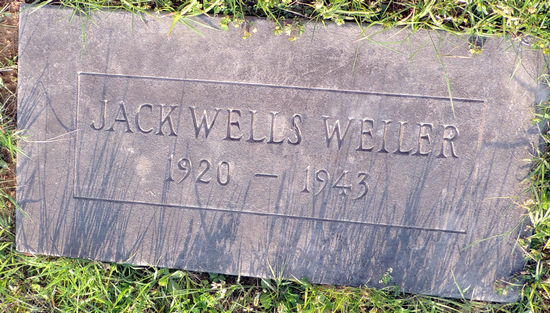Jack Weiler
| Date and Place of Birth: | circa 1920 Johnson City, Tennesee |
| Date and Place of Death: | March 24, 1943 Bolling Field, Washinton, DC |
| Baseball Experience: | Minor League |
| Position: | Shorstop |
| Rank: | Aviation Radioman First Class |
| Military Unit: | US Navy |
| Area Served: | United States |
"Take my nephew Jack Weiler a ball and glove so he can learn to play ball," wrote 7-year-old Geraldine Campbell in a letter to Santa printed in the Johnson City Daily Staff in 1922. Jack was destined to be a ballplayer from a very young age, but destiny meant his life came to an end far to soon.
Jack W. Weiler, the son of Charles J. "Jack" and
Eva Weiler was born in Johnson City, Tennessee in 1920. His father
operated the soda fountain at the Chambliss-Smith drugstore on the
corner of Main and Roan streets in Johnson City, but he was better known
for his ballplaying. By the early 1930s, the senior Weiler coached the
Johnson City Mills team, and watched his son develop into a fine
infielder with the Science Hill High School team. Jack Weiler was
coached by his day when he played American Legion junior baseball and
went on to play with the Gloria Mills team and then at Milligan College
(now Milligan University), Tennessee in 1938.
In January 1939, Jack was signed by Walter Pattee, business manager of
the Johnson City Cardinals of the Class D Appalachian League, and spent
spring training with the Gastonia Cardinals of the Class D Tar Heel
League. Back with Johnson City for the start of the regular season,
Weiler was used sparingly by manager Ollie Vanek. "Jack has a wonderful
arm," he told the Johnson City Chronicle on May 14, 1939,"and he can
field. But for his hitting I don't know. It's hard to tell about these
youngsters. After a little experience, and when correction of his
batting faults have been made, he may prove a real hitter. He's the
nonchalant type and is more than eager to learn. He's picked up a lot
already."
Weiler didn't get much time to develop at Johnson City as he was
released later that month, joining the Elizabethton Betsy Red Sox of the
same league. His stay in Elizabethton was also brief, joining the Logan
Indians of the Class D Mountain State League where he saw more playing
time, appearing in 33 games and batting .190. Weiler was on the move
again in August, joining the Mansfield Braves of the Class D Ohio State
League, where he played 21 games and batted .214. One thing Weiler had
shown in his rookie season in professional baseball was versatility on
the field, playing shortstop, third base, outfield and pitching in at
least one game.
When Weiler returned to Johnson City in September 1939. His family had
moved to Charleston, South Carolina, where his father had acquired a job
as a pipe fitter at the navy yard. Jack wanted to remain in Tennessee,
but required employment to do so. When no suitable offers came forward
he joined his parents in South Carolina.
1939 was to be Weiler's only year in organized baseball. He joined the
U.S. Navy at Norfolk, Virginia in 1940, and had attained the rank of
aviation radioman first class by 1943. Aged 23, and engaged to Vurlia
Hinkle of Holden, West Virginia, and stationed at Anacostia Naval Air
Station in Washington, DC, Weiler was one of four crew members aboard a
twin-engined Curtiss R5C-1 Commando that took off from Anacostia on a
test flight on March 24, 1943. The aircraft, piloted by Assistant Flight
Test Officer Major Albert H. Bohne, stalled just after take-off and
crashed on the runway of Bolling Field, the Army Air Force facility that
was immedialtely south of Anacostia. Engulfed in flames, there were no
survivors.
Jack Weiler's body was returned to Johnson City. A funeral service was
held at Munsey Memorial Church on March 28, and he was buried at Monte
Vista Memorial Park.
Date Added May 5, 2022
Thanks to Jack Morris for "discovering" Jack Weiler.
Baseball's Greatest Sacrifice is associated with Baseball Almanac
Baseball's Greatest Sacrifice is proud to be sponsored by

